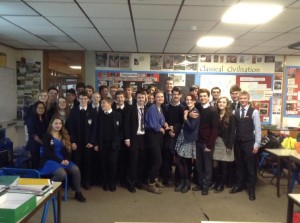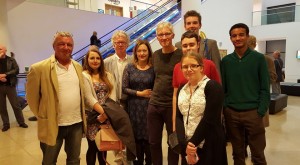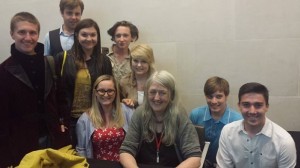Paul Found is a former Open University student who now teaches at Norton Knatchbull School in Kent. Here he tells us how his Open University MA in Classical Studies has enabled him to introduce the subject to his school’s curriculum.
We experience very few truly life-defining moments, but clicking on the ‘apply now’ button for my first Open University course is undoubtedly the one that put me on the path to the most rewarding career move I have undertaken.
It was 2005, and after working on the Channel Tunnel construction and for several years in the diving industry, I decided I was fed up with getting cold, wet and dirty for a living and it was time for a change. I decided on a career in teaching and I needed a degree, despite the fact I hadn’t written an essay since I left school in 1978. I also had a family and a mortgage, so there was no way I could give up working and this was where the Open University presented itself as the only viable option.
My decision to study for a masters in Classical Studies was itself driven by the presentation of the classical units in the old A103 module ‘An Introduction to the Humanities’ – and while I enjoyed every aspect of study, the units on the Colosseum and classical architecture, gladiators, and Euripides’ Medea had me hooked. Switching to a Classics undergraduate degree would have been simple, but I needed a job, and felt that the combination of English and History would give me more schools to choose from. Along with a mixture of luck and pure stubbornness on my part, however, the OU Classical Studies MA has allowed me to introduce Classical Studies to my school curriculum and to forge for myself the position of leading the subject alongside my role as a Teacher of English.
Studying for an MA in Classical Studies without a prior qualification in the subject was both challenging and rewarding in equal measure. The academic level of the course materials, coupled with the elevated academic requirement for the marked assignments, very quickly made me realise I was going to have to ‘up my game’. My tutor’s level of knowledge and expertise meant there would be no taking short-cuts and for me ‘near enough’ was never going to be ‘good enough’. The feedback for the first submission of my final dissertation began with ‘Oh dear Paul…’, and for the revised submission with ‘We need an urgent meeting!’ I started again, spending my entire summer holidays locked away working on the dissertation. The final result narrowly missed out on a distinction, but the experience of that year equipped me for the rigours of a teaching career more than anything the classroom or teacher training could throw at me.
The final year of the MA coincided with my first year at the Norton Knatchbull Grammar School in Ashford, Kent, which followed three years working in a somewhat challenging secondary school. Employed as a Teacher of English, I was delighted to be allocated an A level English Literature class and even more delighted that one of the set texts was Captain Corelli’s Mandolin, a novel that draws many parallels with Homer’s Odyssey. This, along with the classical references in the Shakespearean texts, presented the only real opportunities to present my classical knowledge in any meaningful way, until the school decided to drop its International Baccalaureate provision and offer a wider range of A levels. Seizing the opportunity, I offered a proposal for Classical Civilisation A level, waved my MA at the right people, and an agreement was reached to include the subject on the curriculum.
I had arguably the most eclectic bunch of students you could imagine in that first intake, ranging from a student who has subsequently gone on to study English Literature at Cambridge to another whose main interest was in computers and who hardly knew which way up to hold a pen! The one thing they all had in common was that none really knew what Classics was all about when they signed up. Those who stayed on to continue at A2 had really caught ‘the Classics bug’, and their enthusiasm did much to raise the profile of the subject. I’m delighted to report that Classical Civilisation is now the fastest-growing academic subject in the school, with five of this year’s Y13 having applied to study Classics degrees at various universities.
The subject has now expanded to a lunchtime Latin club and a well-attended extra-curricular GCSE Classical Civilisation class. Much of this is driven by the 6th form students; some even assist with the GCSE teaching and help to deliver a new initiative to take after-school Latin into a local primary school. The now annual Classics drama production has become one of the most anticipated events on the school calendar and we have a schedule of trips, events and lectures which mean we are always looking forward to something outside of the classroom, including an annual trip to Rome.
While studying with the OU taught me a great deal about the importance of time-management, it also ignited an insatiable (if time-consuming!) hunger for knowledge which went far beyond the scope of my OU assignments. It was always satisfying gaining that knowledge through totally independent study and being able to meet the assessment deadlines despite the pressures of work and life in general. How does this help me in my work? I don’t need to ‘teach’ my students what they can read in a book – they can do that themselves. In addition to ‘how to pass the exam’, I teach them what the OU taught me – how to take ownership of the subject, personalise their studies and use them as a foundation to go off and explore independently some of the many wonderful aspects of ancient life and culture.
How far we can expand Classical Studies at my school, I don’t yet know. I am currently the only teacher of the subject there, and there is only so much one person can do, but it is the enthusiasm and dedication of my students which will determine how far we can develop each year. On current form, we are going a long, long way!
Paul Found MA (Class. Stud.), Norton Knatchbull School (http://www.nks.kent.sch.uk/)
Editor’s note: If you’ve been inspired by Paul’s story and would like to find out more about postgraduate qualifications in Classical Studies at the Open University you can do so by visiting our departmental web pages here. The undergraduate humanities foundation module which Paul mentions in his post has been replaced by a newer version, The Arts Past and Present, which still includes lots of classical material: see here for more information and taster materials from that module.



Paul, I am so glad that you achieved your goal in obtaining a Master’s degree in Classical Studies. Teaching grammar school is far better than the other job that you were doing before. You made a good choice. When did you get your Master’s degree in Classical Studies at the Open University? I am doing a Master’s degree in Classical Studies right now. I hope that one day I make this journey like you did.
I work at The Open University and my son is one of those fortunate enough to be taught and inspired by Paul Found at Norton Knatchbull. His enthusiasm for the subject is infectious and he motivates his pupils immensely, encouraging and supporting them to exceed their own expectations whilst studying this fascinating subject. I have learnt lots too, albeit third hand from discussions with my son.
I am proud to work for an organisation which has such a direct impact on learning and teaching in our schools and hope that many more people will find with the OU, the springboard that they need to make such a tangible impact on the lives of our young people.
It’s great to see Paul getting some well deserved recognition here.
Silvia – I gained my MA in 2011 and I believe it was replaced by the new course the following year. On an academic level, I agree that teaching grammar school is more rewarding than secondary school as sadly, everything is about results these days. However, I ran an after-school Classics Club at my previous school and the level of engagement and enthusiasm from the students was truly heart-warming, especially considering the majority of them could hardly string a coherent sentence together! Many came from troubled backgrounds and the likes of Odysseus and Medea gave them stories they could actually relate to. In truth, I prefer the higher academic level I’m currently teaching but I really do feel Classics ìs not an exclusive subject and there’s something in it for everyone.
Amanda – you are too kind!